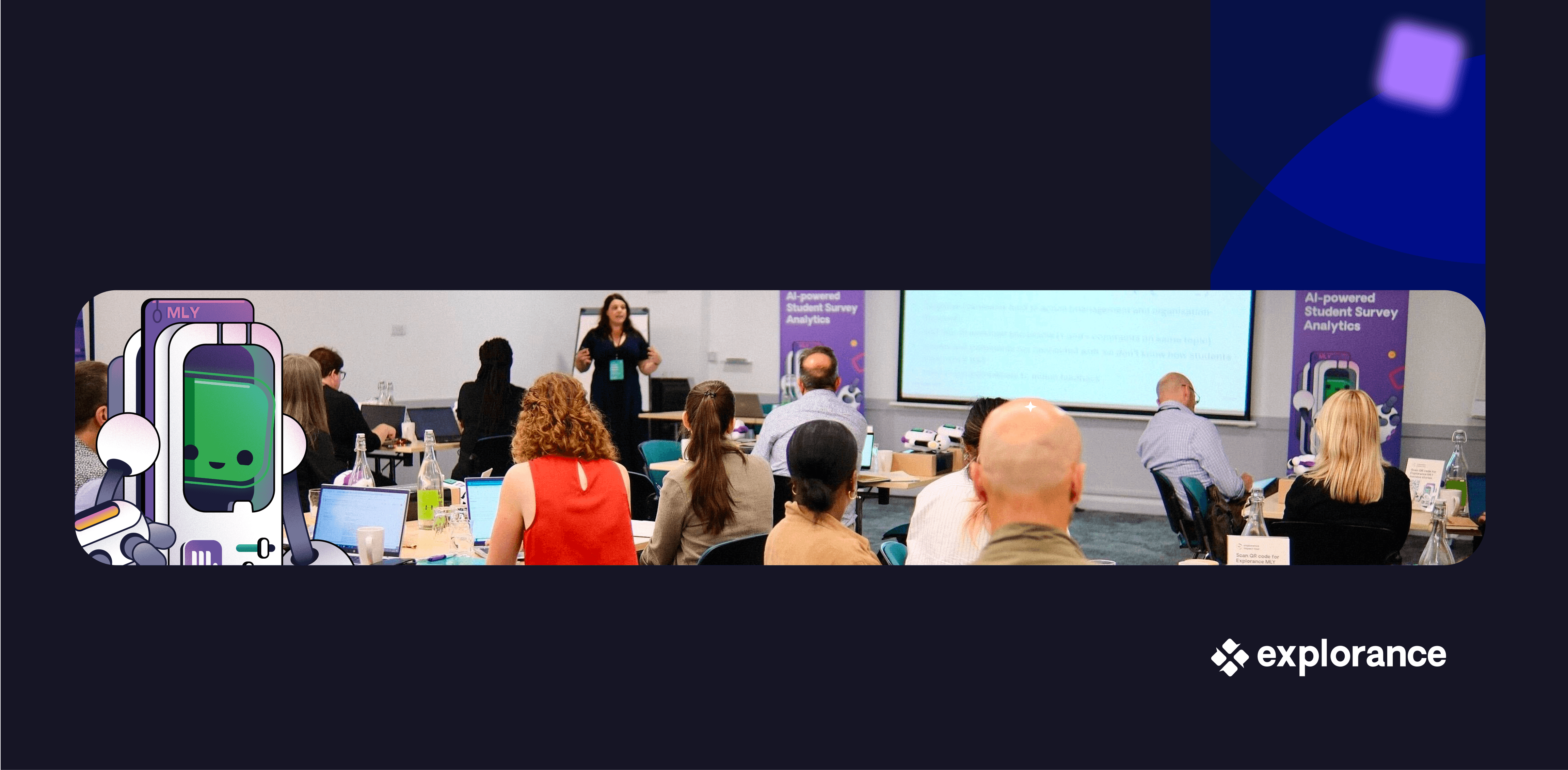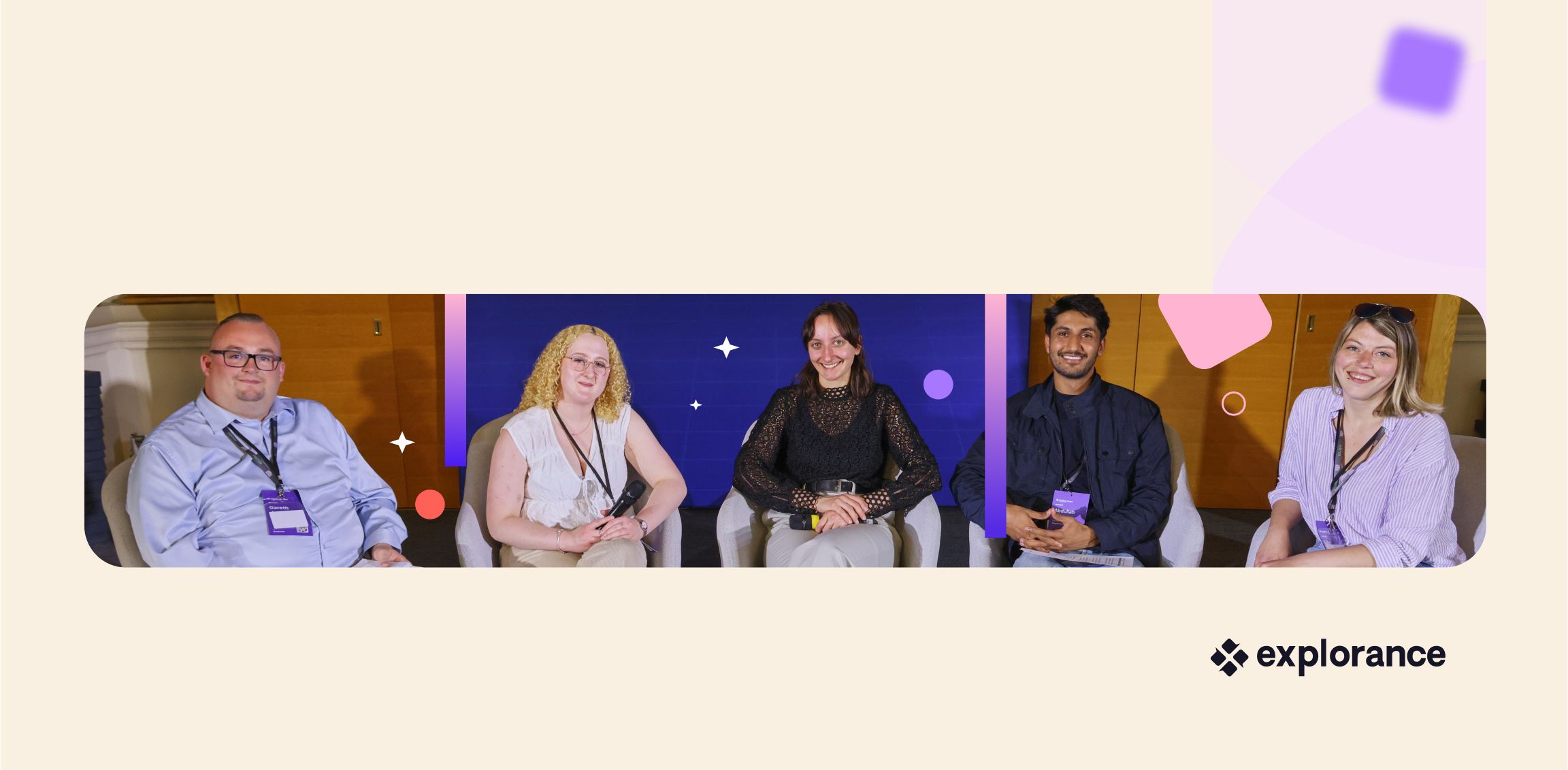6 Big Takeaways from the Student Evaluations Explorance Impact Tour Event in South Africa


In Fall 2025, Explorance hosted the latest edition of the South Africa Impact Tour, in collaboration with the University of the Witwatersrand. From inspiring keynotes to hands-on sessions and meaningful conversations, the two-day event showed just how powerful feedback can be when education and technology come together.
This year's event theme was: Enhancing the Quality of Learning & Teaching through Student Evaluations.
The ideas, energy, and community spirit from over 70 delegates included:
- Engaging discussions on student and employee experience
- Real stories of listening and action in higher ed and the workplace
- New connections built across various institutions, departments, and regions
Overall, it showed how much feedback shapes change. It was the openness, curiosity, and community that defined every conversation.
Here are six major takeaways that from the event:
1. Innovating Together: Institutional Strategies for Students and Academics in Teaching Quality Enhancement
In an opening presentation, Nompumelelo Mazibuko, Evaluations Coordinator in the University of the Witwatersrand's Quality and Academic Planning Office, explained the institution's strategic approach to student success and the student feedback process.
"Academic development is linked to ongoing reflection and feedback," she said. "Through student evaluations, it creates a cycle of continuous improvement that benefits both staff and students. There is a need for consistent engagement with quality through reflexive and generative methodologies, aimed at driving and nurturing continuous improvement efforts."
You can read a case study on the University of the Witwatersrand's use of Explorance Blue, and a news story on their adoption of Explorance MLY.
2. Leveraging Artificial Intelligence for Qualitative Analysis and Decision-Making in Higher Education
Separately, Dr Celine Meyers, Institutional Researcher and BI Analyst at the University of Witwatersrand, outlined the scale of the challenge around qualitative data.
At Wits, with more than 40,000 students, thousands of open-ended comments, and over 50 research projects per annum, but only "4-5 staff members in a team stretched beyond capacity" to process data. The result was an environment where "quantitative data dominates, silencing rich student voices".
In a case example presented by Dr Myers, she discussed three large-scale surveys with over 200,000 comments from students, staff, and alumni that needed to be read, coded, and interpreted. She highlighted challenges with open-ended feedback, such as "long paragraphs, emotional reflections, personal stories", "weeks of manual coding, pillar-by-pillar", and "cross-checking, reliability testing".
Enter MLY, with insights also shared on its impact in other universities such as Heriot-Watt University, Liverpool John Moores University, University of Newcastle, University of Manchester, and University of Westminster.
3. Lightning Talk: University of Fort Hare's Journey with Explorance Blue
Explorance was grateful to Patricia Muhuro, Senior Teaching and Learning Consultant at the University of Fort Hare, for sharing the institution's challenge around "tedious module report writing" and how strategic goals to pursue high quality and innovative teaching and learning led them to Blue.
With "module evaluations as a strategy to solicit stakeholder feedback", these are "enhancing the quality of curriculum design and delivery through intentionally embracing student feedback in all learning processes", "informing decision making and resource allocation" and, through reflective teaching practice, "identifying growth opportunities, and academics share how they act on student feedback to improve teaching".
Explorance is fully integrated with the University's LMS, enabling individual-level module feedback, qualification-level reports, and institutional-level reports.
4. Expanding Feedback Innovation: UCT's Journey with Explorance Blue and MLY
The University of Cape Town first moved from paper-based to online course evaluations in 2008. Despite successfully transitioning to an online system, the underpinning principles of self-service at the course level and the use of new shared evaluation templates were not adopted university-wide, and two out of six Faculties developed their own templates.
The original vision for a unified course report, with both quantitative course performance data (demographics and grades) and course evaluation data, did not come to life. In response, the University appointed Explorance in May 2023, and Blue was implemented from June to October the same year, with course evaluations for the first set of courses (opt-in, mostly first year students) taking place in November 2023.
In 2024, UCT became the first South African university to adopt MLY, described as "an important part of our infrastructure for student voice and decision making", initially for analysis for free-text comments in South African Survey of Student Engagement (SASSE). You can read more on this development here.
5. Data Can Do More Than Inform: Imperatives for Data That Could Lead to Change in Teaching and Learning
Dr Rejoice Nsibande, Deputy Director of Academic Development at the University of Pretoria, explored the move from simply reporting data to transforming practice. She presented the alignment of student feedback practices with improving teaching quality and student success as well as areas of good practice and student engagement in quality assurance and promotion being championed at a national level.
"In conclusion, transforming practice means carefully managing all Actants, both Human and non-Human," Dr Nsibande said, before outlining a map for building space for transformative student feedback, including:
- Positioning feedback as a shared responsibility
- Training students and staff on the value of feedback
- Allocating resources to strengthen feedback systems
- Integrating feedback into development and curriculum
- Showing students how feedback leads to tangible improvements
6. International Speaker: Bath Spa University's Journey to a Stronger Student Voice
Providing another compelling global perspective, Rachel Garman, Student Experience Manager - Digital Lead at Bath Spa University, spoke about a previously "fragmented" approach to evaluation which "desperately needed unifying".
The National Student Survey (NSS), and its Student Voice section, was a key institutional driver. Having selected Blue in 2023, Bath Spa is now entering its third year with Explorance - and has also since added MLY. Rachel shared how this solution provides a "centralised, user-friendly platform that improves student feedback response rates and provides shareable, actionable insights through a 360° output to enhance the learning experience".
A heartfelt thank you to every speaker, panellist, and participant who made this year's event such a success - and a special word of appreciation to our co-host, the University of the Witwatersrand. It is these collective voices that make the feedback movement thrive, and the insights and collaboration which help shape a more connected, data-informed, and student-centred future for higher education in South Africa.

Phil is a specialist PR, communications, and stakeholder engagement consultant with 22 years' experience in both in-house and consultancy roles. He support universities, multi-academy trusts and schools, as well as commercial organizations targeting the education sector, to support their profile, reputation and business development objectives.
Related Articles



